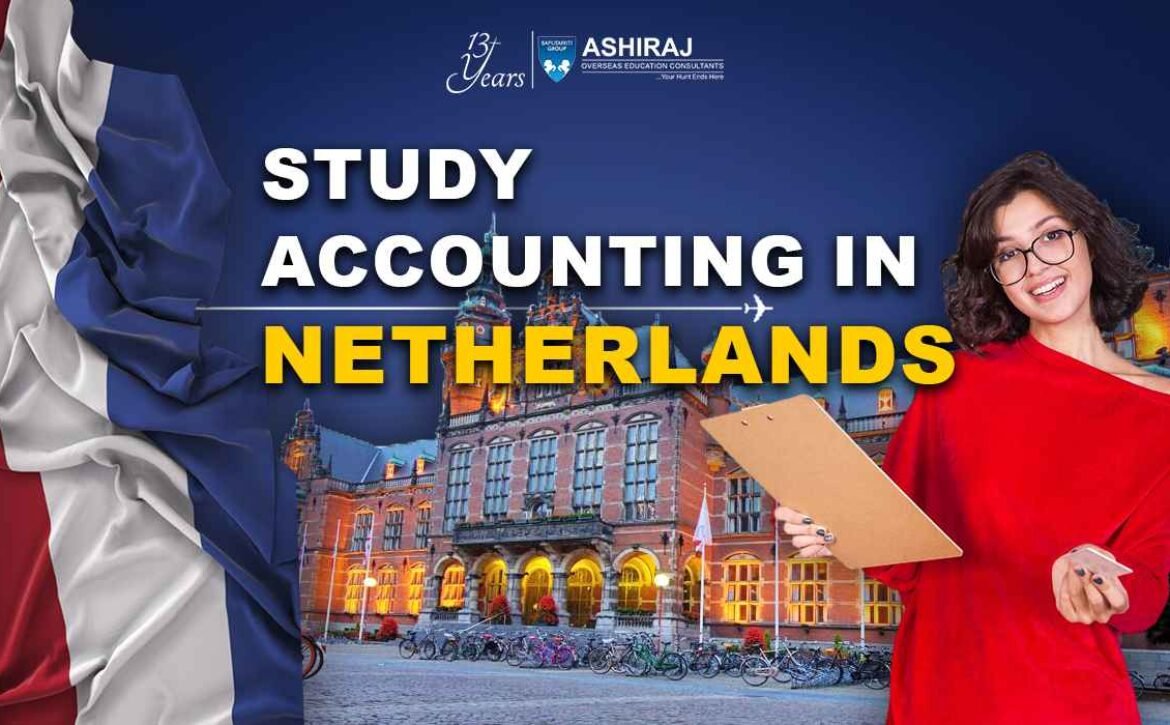
Accounting in Netherland
Accounting in the Netherlands encompasses a dynamic landscape shaped by the country’s robust economic infrastructure and regulatory framework. Renowned for its transparency and adherence to international standards, Dutch accounting practices serve as a cornerstone for businesses operating within its borders and beyond. The Netherlands boasts a sophisticated financial ecosystem, supported by a network of skilled professionals and cutting-edge technologies, ensuring accurate reporting and compliance with regulatory requirements.
Navigating the intricacies of Accounting in the Netherlands requires a nuanced understanding of Dutch GAAP (Generally Accepted Accounting Principles) and IFRS (International Financial Reporting Standards). From multinational corporations to small and medium enterprises, entities operating in the Netherlands rely on meticulous accounting practices to drive informed decision-making and foster financial stability. In this diverse and competitive market, the adept application of accounting principles and technologies is essential for businesses to thrive amidst evolving regulatory landscapes and global economic shifts.
Why Study Accounting in the Netherlands?
- International Reputation: The Netherlands is renowned for its transparent and robust accounting standards, making it an ideal location to study accounting practices recognized worldwide.
- Diverse Business Environment: The Dutch economy hosts a diverse range of industries, offering students exposure to various sectors and real-world accounting challenges, enriching their learning experience.
- Innovative Education: Dutch universities offer innovative accounting programs, integrating theoretical knowledge with practical applications, preparing students for the complexities of modern accounting practices.
- Global Networking Opportunities: Studying accounting in the Netherlands provides access to a vibrant international community, fostering valuable connections with peers and professionals from around the world.
- Career Advancement: With its thriving business environment and emphasis on high-quality education, studying accounting in the Netherlands can open doors to lucrative career opportunities both locally and internationally.
- Focus on Sustainability: Dutch accounting education often includes a focus on sustainability and ethical practices, aligning with global trends towards responsible business conduct.
- Multilingual Environment: The Netherlands is known for its multilingual population and English-taught programs, offering a welcoming environment for international students pursuing accounting studies.
- Gateway to Europe: Positioned at the heart of Europe, studying accounting in the Netherlands provides students with easy access to major European financial centers, enhancing their career prospects on a continental scale.
Top Universities to Study Accounting in Netherlands
University | QS World University Ranking 2023 | Type of University | Average Annual Fees (EUR) | Programs Offered |
University of Amsterdam | 25 | Public | €2,168 – €15,000 | Bachelor’s, Master’s, PhD |
Erasmus University Rotterdam | 39 | Public | €2,209 – €14,500 | Bachelor’s, Master’s, PhD |
Delft University of Technology | 48 | Public | €2,083 – €14,000 | Bachelor’s, Master’s, PhD |
Leiden University | 65 | Public | €2,168 – €14,000 | Bachelor’s, Master’s, PhD |
University of Groningen | 75 | Public | €2,083 – €14,500 | Bachelor’s, Master’s, PhD |
Studying accounting in the Netherlands offers access to top-tier universities recognized for their academic excellence and innovative programs. Here’s a list of the top universities in the Netherlands for accounting studies, along with their QS World University Rankings for 2023:
- University of Amsterdam: Ranked 25th globally, it offers a wide range of accounting programs at affordable average annual fees.
- Erasmus University Rotterdam: Ranked 39th globally, it provides comprehensive accounting education with moderate average annual fees.
- Delft University of Technology: Ranked 48th globally, it offers specialized accounting programs alongside its renowned engineering curriculum.
- Leiden University: Ranked 65th globally, it provides diverse accounting programs within a prestigious academic environment.
- University of Groningen: Ranked 75th globally, it offers quality accounting education with a focus on research and practical application.
Course Curriculum for Accounting in Netherlands
- Foundational Courses: Accounting programs in the Netherlands typically start with foundational courses covering principles of accounting, financial reporting, and managerial accounting, ensuring a solid understanding of fundamental concepts.
- International Accounting Standards: With a focus on global relevance, Dutch accounting curricula often include modules on International Financial Reporting Standards (IFRS) and their application in diverse business contexts, aligning with the country’s international business environment.
- Advanced Financial Analysis: Students delve into advanced financial analysis techniques, learning to interpret financial statements, assess company performance, and make strategic financial decisions, essential skills for accounting professionals in the Netherlands.
- Taxation and Compliance: Courses on taxation and compliance provide students with insights into Dutch tax regulations and compliance requirements, preparing them to navigate the complex tax landscape and ensure regulatory compliance for businesses.
- Business Ethics and Sustainability: Reflecting the Netherlands’ emphasis on ethical business practices and sustainability, accounting programs often incorporate modules on business ethics, corporate social responsibility, and sustainable accounting practices, equipping students to address contemporary business challenges.
- Practical Experience: Many accounting programs in the Netherlands offer opportunities for internships, practical projects, or case studies, allowing students to apply theoretical knowledge in real-world settings and gain valuable hands-on experience. Such practical exposure is integral to preparing students for successful accounting careers in the Netherlands and beyond.
Eligibility Criteria & Admission Requirements for MS in Accounting in Netherlands
- Language Proficiency: Applicants must demonstrate proficiency in English by providing either IELTS or TOEFL scores. The minimum scores typically required are IELTS 6.5 or TOEFL iBT 90, ensuring that students can effectively participate in English-taught accounting programs in the Netherlands.
- Standardized Tests: Some universities may require applicants to submit GRE or GMAT scores as part of their application. While not always mandatory, competitive scores in these exams can strengthen an applicant’s profile and increase their chances of admission to top accounting programs.
- Documentary Requirements: Prospective students must prepare necessary documents, including a valid passport, academic certificates (such as transcripts and diplomas), and proof of any relevant work experience. These documents are essential for verifying eligibility and processing student visa applications.
- Student Visa: International students intending to study accounting in the Netherlands must obtain a student visa. This requires submitting the necessary documentation, including proof of acceptance into an accredited accounting program, financial means to support oneself during the study period, and health insurance coverage.
- Academic Excellence: While specific academic requirements may vary by institution, applicants are generally expected to have a strong academic background, with a focus on relevant subjects such as mathematics, economics, or business studies. Excellent academic performance in previous studies can enhance an applicant’s chances of admission to prestigious accounting programs in the Netherlands.
Criteria | Minimum Score |
IELTS | 6.5 |
TOEFL iBT | 90 |
GRE | 310 |
GMAT | 600 |
Ensuring compliance with these eligibility criteria is crucial for prospective students aspiring to pursue accounting studies in the Netherlands, facilitating a smooth application process and maximizing their chances of academic success.
Documents Required for Studying Accounting in Netherlands
- Passport: A valid passport is essential for international students applying to study accounting in the Netherlands. It serves as proof of identity and is required for visa processing and entry into the country.
- Letters of Recommendation (LOR): Applicants typically need to submit two or more LORs from academic or professional referees who can attest to their qualifications, skills, and suitability for accounting programs in the Netherlands.
- Statement of Purpose (SOP): An SOP is a personal statement outlining the applicant’s academic and career goals, reasons for choosing accounting in the Netherlands, and how the program aligns with their aspirations.
- Curriculum Vitae (CV): A comprehensive CV detailing the applicant’s educational background, work experience, extracurricular activities, and any relevant achievements is required as part of the application package.
- Official Transcripts and Educational Certificates: Applicants must provide official transcripts and certificates from their high school and any previous academic institutions attended, demonstrating their academic qualifications and eligibility for accounting programs.
- Work Experience Certificate: If applicable, applicants should submit a work experience certificate verifying any relevant professional experience in accounting or related fields.
- Proof of Financial Resources: To obtain a student visa, applicants must demonstrate sufficient financial resources to cover tuition fees, living expenses, and other costs associated with studying and living in the Netherlands.
Ensuring all necessary documents are prepared and submitted accurately is crucial for a successful application to accounting programs in the Netherlands, facilitating admission and enrollment in desired academic institutions.
Admission Process for Accounting in Netherlands
- Research: Begin by researching accounting programs offered by universities in the Netherlands. Consider factors such as program curriculum, faculty expertise, and university reputation.
- Check Eligibility: Review the admission requirements for each program, including academic qualifications, language proficiency tests (such as IELTS or TOEFL), and standardized test scores (such as GRE or GMAT).
- Prepare Documents: Gather required documents, including passport, educational transcripts, letters of recommendation, statement of purpose, curriculum vitae, and proof of financial resources.
- Submit Application: Complete the online application form for your chosen accounting program, ensuring all required documents are attached and submitted before the deadline.
- Wait for Response: After submitting your application, wait for the university’s response. This may include an invitation for an interview or further documentation if necessary.
- Interview (if required): If selected, participate in an interview with university representatives to discuss your academic background, career goals, and suitability for the program.
- Receive Offer: Upon successful evaluation of your application, you will receive an offer of admission from the university.
- Accept Offer and Apply for Visa: Once you receive the offer, accept it and proceed to apply for a student visa to study accounting in the Netherlands.
- Arrive in the Netherlands: Upon obtaining your student visa, make necessary arrangements for travel and accommodation, and prepare to embark on your academic journey in the Netherlands.
Navigating the admission process for accounting programs in the Netherlands requires careful planning, attention to detail, and adherence to deadlines, ensuring a smooth transition into your chosen academic institution.
“Education is the most powerful weapon which you can use to change the world.”
Nelson Mandela
Cost of Accounting Course in Netherlands
- Tuition Fees: The cost of tuition for accounting programs in the Netherlands varies depending on the university and level of study. On average, international students can expect to pay between €2,000 to €15,000 per year for bachelor’s and master’s programs in accounting.
- Living Expenses: In addition to tuition fees, students must budget for living expenses, including accommodation, food, transportation, and other personal costs. The cost of living in the Netherlands is moderate compared to other European countries, with monthly expenses ranging from €800 to €1,200, depending on the city and lifestyle.
- Health Insurance: International students are required to have health insurance while studying in the Netherlands. The cost of health insurance varies depending on the coverage and provider but typically ranges from €80 to €120 per month.
- Books and Supplies: Students should budget for textbooks, course materials, and other academic supplies, which can amount to a few hundred euros per year.
- Miscellaneous Expenses: Miscellaneous expenses may include visa application fees, residence permit fees, and extracurricular activities. It’s essential to account for these additional costs when planning your budget for studying accounting in the Netherlands.
Overall, while studying accounting in the Netherlands can be a significant investment, the country offers high-quality education, a vibrant cultural experience, and excellent career prospects, making it a worthwhile destination for international students.
Scholarships for Accounting Courses in Netherlands
Scholarship Name | Amount | Application Deadline |
Holland Scholarship | Up to €5,000 | 1 February |
Erasmus Mundus Scholarships | Varies | Varies |
Orange Tulip Scholarship | Varies | Varies |
Netherlands Fellowship Program | Varies | 1 February |
Amsterdam Merit Scholarships | Up to €25,000 | 15 January |
- Holland Scholarship: Awarded to non-EEA students pursuing a bachelor’s or master’s degree in the Netherlands. Application deadline: 1st February.
- Erasmus Mundus Scholarships: Offered to international students for specific Erasmus Mundus Joint Master’s Degree Programs. Application deadline varies depending on the program.
- Orange Tulip Scholarship: Available for international students from selected countries pursuing bachelor’s or master’s degrees in various fields. Application deadline varies.
- Netherlands Fellowship Program: Provides fellowships for master’s and PhD students from selected countries pursuing studies in the Netherlands. Application deadline: 1st February.
- Amsterdam Merit Scholarships: Awarded to outstanding students from outside the EU/EEA who have been admitted to a master’s degree program at the University of Amsterdam. Application deadline: 15th January.
These scholarships offer financial assistance to international students pursuing accounting studies in the Netherlands, helping to offset tuition costs and living expenses. It’s essential to check the specific eligibility criteria and application deadlines for each scholarship opportunity.
Career Opportunities After Accounting in Netherlands
Job Profile | Average Salary (EUR) |
Financial Accountant | €40,000 – €60,000 |
Management Accountant | €45,000 – €70,000 |
Tax Consultant | €50,000 – €80,000 |
Auditor | €45,000 – €70,000 |
Financial Analyst | €45,000 – €75,000 |
- Financial Accountant: Responsible for maintaining financial records, preparing financial statements, and ensuring compliance with accounting standards. Average salary ranges from €40,000 to €60,000 per year.
- Management Accountant: Analyzes financial information to support managerial decision-making, budgeting, and strategic planning. Average salary ranges from €45,000 to €70,000 per year.
- Tax Consultant: Provides tax advice, assists with tax planning, and ensures compliance with tax regulations. Average salary ranges from €50,000 to €80,000 per year.
- Auditor: Examines financial statements to verify accuracy and compliance with regulations. Average salary ranges from €45,000 to €70,000 per year.
- Financial Analyst: Analyzes financial data, prepares forecasts, and provides insights to support investment decisions. Average salary ranges from €45,000 to €75,000 per year.
These career opportunities in accounting offer competitive salaries and opportunities for professional growth in the dynamic business environment of the Netherlands. With strong demand for skilled accounting professionals, pursuing a career in accounting in the Netherlands can lead to rewarding and fulfilling employment prospects.
Frequently Asked Questions About Accounting in Netherlands
Entry requirements typically include a high school diploma or equivalent, language proficiency (IELTS/TOEFL), and sometimes standardized test scores like GRE/GMAT.
Yes, there are several scholarships available, including the Holland Scholarship, Erasmus Mundus Scholarships, and Orange Tulip Scholarship.
Tuition fees vary but generally range from €2,000 to €15,000 per year for bachelor’s and master’s programs in accounting.
Yes, international students are allowed to work part-time during their studies, typically up to 16 hours per week.
Career opportunities include roles such as financial accountant, management accountant, tax consultant, auditor, and financial analyst, with competitive salaries and opportunities for growth.
Bachelor’s programs typically take three years to complete, while master’s programs usually take one to two years.
Many accounting programs in the Netherlands are offered in English, so Dutch language proficiency is not always required. However, learning Dutch can be beneficial for daily life and career opportunities.
Application deadlines vary by university and program but often fall between January and February for programs starting in September.
Yes, international students need to apply for a student visa to study in the Netherlands, which requires proof of acceptance into an accredited program, financial means, and health insurance.
Universities often provide assistance in finding accommodation, and there are also private rental options available. It’s advisable to start the search early and explore different housing options.




